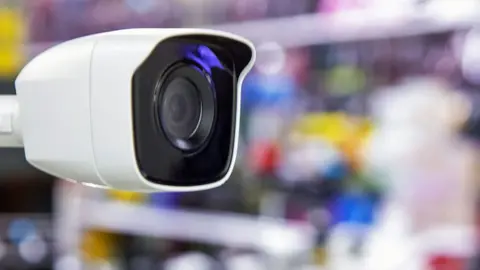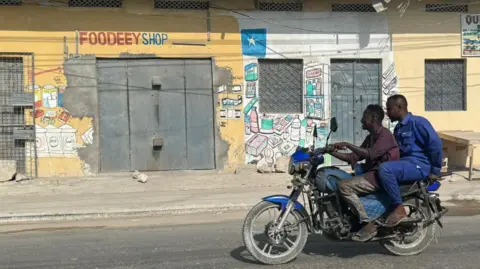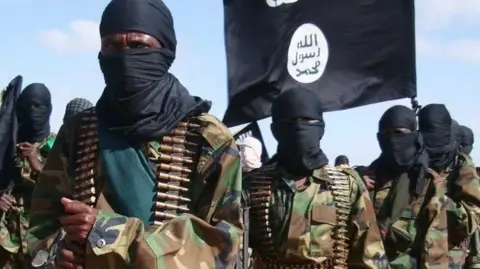
 Getty Images
Getty ImagesShopkeepers in the Somali capital, Mogadishu, find themselves between a rock and a hard place due to a government directive requiring the installation of surveillance cameras outside their shops to intensify surveillance of Islamist rebels who have a strong presence in the city.
Businessmen say that if they put up cameras they risk being shot by Al-Shabaab rebels, and if they don't, they could be arrested by police.
The BBC changed the names of the businessmen and homeowners for their safety.
“The security cameras are the reason you can see me at home now,” says Hamza Nour, a 48-year-old former shop owner, sitting on a sofa holding one of his children.
He told the BBC that he made the painful decision to sell his company to avoid angering either side.
“You're asked not to remove the cameras on one side, and then you're asked to remove the cameras on the other side. Depending on the choice you make, you'll either have a bullet or a prison cell waiting for you.” Mr. Nour adds.
The government issued a directive last year to shop owners to install surveillance cameras – at their own expense – to deter Al-Shabaab attacks.
Mogadishu Deputy Mayor Mohamed Ahmed Diri says BBC Africa Daily Podcast The decision has paid off.
“There used to be four or five bombings a month in Mogadishu, but that's no longer the case,” he says.
The government has now ordered residents to install cameras outside homes and apartment complexes, raising fears among many people that Al-Shabaab could bring its war into their homes.
Since October, Al-Shabaab has killed four businessmen in 10 attacks related to the installation of surveillance cameras, according to leading violence monitoring group Armed Conflict Location and Incident Data (Acled).
Aklid added that the government's directives were ultimately intended to disrupt Al-Shabaab's funding sources as it extorts money from shopkeepers, but retaliatory attacks by the insurgents “forced many businesses in Mogadishu's main markets to close their doors for several days.” In a report published on its website.
 Muhammad Jabobi
Muhammad JabobiMr. Nour says he initially ignored government directives but was forced to install cameras after members of the security forces confronted him.
He told the BBC: “I tried to explain to them that I was just a poor man and did not want to get involved with the government, but they got angry and started threatening me, saying that they would ruin my life.”
Mr. Noor says that once the CCTV camera was installed, he started receiving phone calls from unrecognizable numbers.
“My body started shaking inside. I knew who it was,” he says, referring to Al-Shabaab activists who have an established spy network, allowing them to obtain information about civilians like Mr. Nour.
Mr Nour says he only changed his phone number when a young man approached him in his shop one morning.
“He pulled up his shirt, and he had a gun in his waistband. He ordered me to turn on my SIM card.”
Mr. Nour says he agreed, and then the phone rang, as the anonymous caller wanted to know if “the government’s demands are more important to you than ours.”
“I didn't know what to do. The young man with the gun was standing there the whole time. I was thinking, 'Once I get off this phone call, is he going to shoot?' So, I whispered a prayer under my breath,” Mr. Nour adds.
Fortunately, he says, the man “walked out of the store without incident after I hung up.”
Nour says he decided to sell his business after two shop owners were shot dead in October.
“There is nothing more precious than human life,” he says.
 Agence France-Presse
Agence France-PresseCriticizing the government's directives, Nour adds: “People trying to make ends meet are being dragged into a war against a powerful group that the government itself is having difficulties fighting. Just imagine how we feel as civilians.”
Diriyah denies closing companies or forcing their owners to install surveillance cameras.
He admits that some businessmen have concerns, but says the government is doing its best to reassure and protect them.
“The city is quiet and business is smooth,” Diri adds.
But Asiu Mohamed Warsame told the BBC that masked gunmen killed her 40-year-old brother, Dahir Mohamed Warsame, in his shop in the Yaqshid area of Mogadishu in October after he installed surveillance cameras under pressure from security forces.
“He left behind six children, the youngest of whom is only four months old,” she says.
Shop owner Ismail Hashi, 33, says he closed his shop after anonymous calls from suspected Al-Shabaab elements.
He told the BBC: “They knew my name and more. It was as if they knew everything about me already.”
Mr. Hashi adds that he later received a call from the police asking him to open his shop – and when he ignored them, he was detained for a few days before being released.
Mr Hashi says he has now reopened his business.
“I still have surveillance cameras installed on orders from the government, but I know that the government cannot protect me if someone decides to kill me,” he says.
Hashi adds: “Every time I stand behind the counter and someone I don't know enters, I get nervous and wonder if this is the person sent to kill me.”
Saidu Abdullahi Mohammed, 39, told the BBC that he was arrested for not installing a surveillance camera at his home in the Wajir area.
He adds that 14 other people were also arrested on his street.
“We were taken to Wadajir District Police Station where we were detained for hours,” says Mr. Mohammed. “We were eventually released after someone with a government ID card came and confirmed us and let us out.”
He adds that he and other residents have now installed surveillance cameras, but they live in fear.
“We as civilians are forced to buy cameras, pay for them to be installed in our homes, and risk exposure to violence from Al-Shabaab. Is this how the government expects to win hearts and minds?”
More BBC stories about Somalia:
 Getty Images/BBC
Getty Images/BBC







